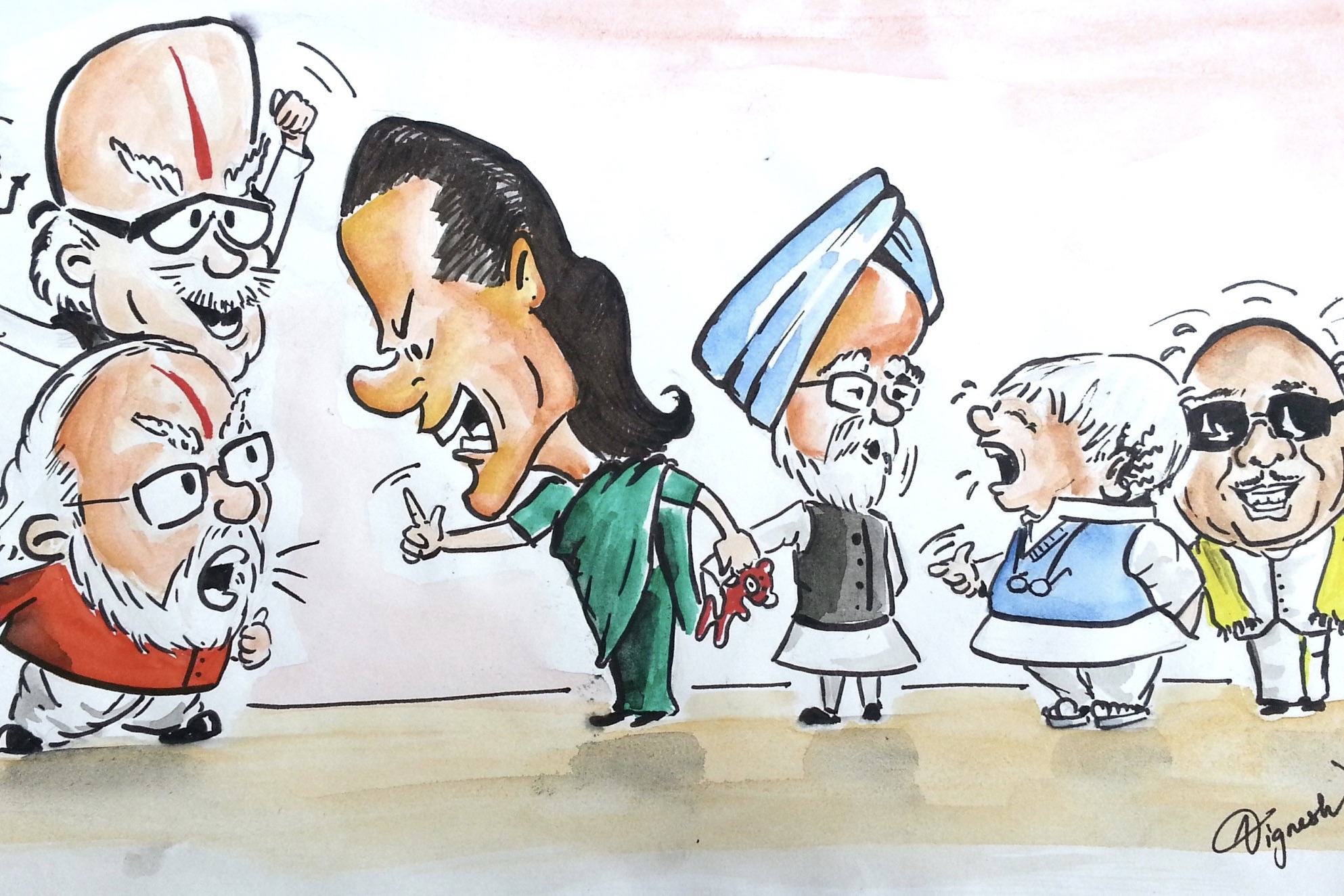
During clinical training doctors are taught to extract information from patients like policemen, specially in suspicious cases like youth presenting with altered sensorium. One such semi-conscious patient came to our clinic and after a routine history my husband started probing for accidental poisoning. He asked whether she had eaten something inadvertently or if something lying around was mistakenly ingested. He must have repeated himself thrice. A Tau, who was the patient’s attendant called me and said ” Behan ji ek baat dhyan se sun le. Es chori ne bhukar hoya tha…us ke bad yo besudh ho gayi. Es case mein kisi bhi kism ka politics nahi sai. Eb ja ke ilaj chalu karwa de.” ( Listen carefully sister, the girl had fever after which she became unconscious. There is no politics in this case. Now go and get the treatment started.)
Some would dismiss this as an eruption of an impatient relative but I was caught in his choice of words. He had used ‘politics.’ for the more commonly used word ghapla (deceit)… case mein koi bhi ghapla nahi hai ( there is no deception in this case). That’s what I enjoy about practising in a rural area. More than any newsroom panel discussion, these unabashed outbursts provide an insight into the times we live in. With one masterful stroke he had commented on the sordid state of Indian politics which would leave any self respecting statesman red-faced and any responsible citizen pensive.
His remark made me recall that ” there is a lot of politics in it !” is an oft repeated refrain whether its appointment of top bureaucrats, directors of institutes of national importance, or even the higher ranks of the armed forces, So what is politics in the eyes of common people and what is it supposed to be ?
The Webster dictionary defines Politics (from Greek: politikos, “of, for, or relating to citizens”) as activities that relate to influencing policies of a government or getting power by influencing people, an organised control over a human community, specifically a state. So by definition there is nothing wrong when politicians acquire power by influencing people. The voters don’t mind this either. They resent what happens after the politicians are administered the oath ” I will uphold the sovereignty and integrity of India, that I will duly and faithfully and to the best of my ability, knowledge and judgment perform the duties of my office without fear or favour, affection or ill-will and that I will uphold the Constitution and the laws.”
They feel cheated because once in office all efforts are spent either to acquire more power or retain what has been achieved. Most of the tenure is spent to placate rival political parties and individuals and hang on to the coveted crown for as long as possible. In this game of thrones their basic duty, good governance and service to the electorate, is neglected and their allegiance to the constitution is forgotten.
Predictably this attitude permeates into the nation’s culture. So just as our leaders want their chosen ones to occupy high posts, the head of important organisations also practice nepotism. This favouritism trickles down to the lowest rung of our society where even a lowly office clerk wants his kin to be appointed peon. The end result is what the Tau said, there is ghapla everywhere, and politics has become shady and suspect. People infer the sanctity of a profession by looking at its practitioners. And politicians who have muscle men, plunderers, hoarders, rapists and murderers amongst them do not paint a pretty picture. This further adds injury to insult and it comes as no surprise that politics is considered evil.
Despite this negative perception, the commoners strive to connect with the system and become an insider. Most of my patients are regular voters but this does not imply that they have faith in democracy. By casting their ballot they attempt to become khaas from aam. I often ask them how they choose and the answer is always the same. They vote for their own. The candidate is more important than the party and the most attractive attribute of a candidate is his caste. Contestants are commonly referred by their caste, not by their name, party or agenda, Rajput ka, Baniye ka, Punjabi ka are common monikers. In a country rife with corruption it must be reassuring to have someone from their clan up there, even if he is no good, for the nation or otherwise. By the time people realise the downside of voting for an undeserving candidate it is too late, and politics becomes murkier.
In case you were wondering, the Tau was truthful. The girl was suffering from meningitis. There was no politics involved!
( published in my column ‘Reading the Pulse ‘ in the Sunday Tribune on 15/11/2015)
Madam, this is Dr. Ramesh Chander, Professor at the University School of Management, Kurukshetra University at Kurukshetra.
I am very delighted to read your write up ” ‘Politics’ in Tau’s mind ” appeared in the Sunday Tribune yesterday, November 15, 2015. It aptly described your sensitivity and commitment to the profession along the undercurrent in social-political milieu.
The narrative made me awed and this mail to salute/appreciate your depth understanding of the issues around, which is rare these days. Never expected a physicians’ pen so sharp (as was in this write up) to weed out the ailing substance.
Delighted to have this, waiting for the next……
Thanks and regards,
Dr. Ramesh Chander
Professor
University school of Management
Kurukshetra University, Kurukshetra
Thanks for your appreciation sir. I have a blog ALifeExtraordinarilyOrdinary.com in which I post all my published and unpublished work. Do visit it sometime.